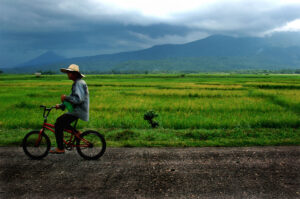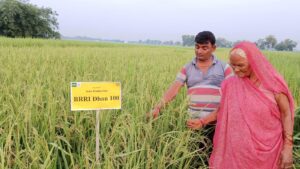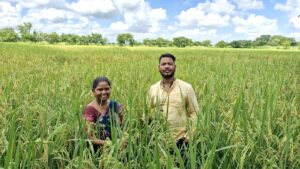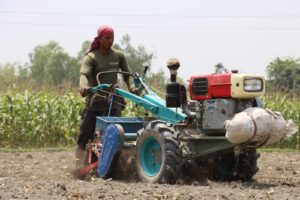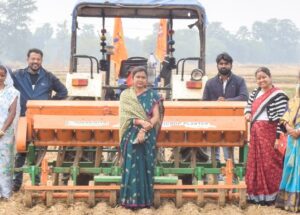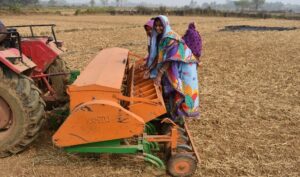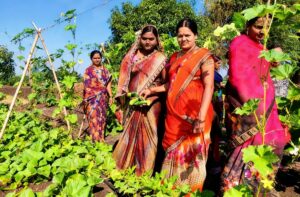
Kamala Gurung was drawn to rural development work at an early age. Her exposure dates back to her high-school years in Nepal when she served as an enumerator for a community survey. After high school, she asked her parents if she could study forestry at the University of the Philippines in Los Baños (UPLB), nearly 4,000 km away!
Kamala’s mother was against the idea at first. Her mother’s apprehension was not about her being so far away from home because she had stayed in a dormitory most of her school years. It was more about the nature of the work of a forester. “It’s too dangerous for a woman,” her mother said.
But, for Kamala, it was not difficult to imagine herself as a forester because she used to trek the mountains of Gorkha and Pokhara in Nepal with her father, who was then a British-Gorkha army officer. “I think my father’s love of nature rubbed off on me,” Kamala said.
Eventually, with her parents’ support, Kamala earned her degree from forestry at UPLB and then worked back home in Nepal as a natural resource management officer. Through her constant interaction with farmer communities, she became more interested in the social aspects of her work. This is where she became deeply involved in social issues, and problems of the marginalized sectors of the community—including women in the agricultural sector.
Advocating for gender equity

“This is what I chose to be,” asserted Kamala, who takes pride in being a self-proclaimed gender equity advocate. “Both my MS and PhD degrees are in gender development and social change in the agricultural sector.” Kamala obtained her MS degree from Clark University in the United States and her PhD from James Cook University in Australia.
Kamala now enjoys her work at the International Rice Research Institute (IRRI) as a social scientist specializing on gender issues in agriculture. “This job gives me a sense of mission to help improve the lives of rural people, especially poor women,” she said.
“Working under the USAID-funded Cereal Systems Initiative for South Asia (CSISA) project in Bangladesh, Kamala has been influential in mainstreaming gender in planning, monitoring, and evaluating the project,” said Thelma Paris, IRRI senior scientist. CSISA aims to increase food, nutrition, and income security in South Asia through sustainable intensification of cereal-based systems. It is a collaborative project among key organizations such as IRRI, the World Fish Center (WorldFish), and the International Maize and Wheat Improvement Center (CIMMYT).
“Gender inequalities in access to productive resources and technologies in rice farming are more pervasive in South Asia,” Kamala explained. “To reduce these inequalities, it is important to understand the crucial roles of women as farmers, consumers, and income earners in relation to men as well as women’s socioeconomic and cultural barriers in ensuring food security and livelihoods.”
In specific regions of Bangladesh, the poorest women do transplanting and weeding in the rice fields as unpaid family workers or as hired agricultural workers. However, in all regions, as soon as harvesting is done, poor women are mainly responsible for manual threshing, winnowing, cleaning, drying, selecting, and storing grains and seed as well as parboiling rice for home consumption or for sale.
“Since women in Bangladesh play a critical role in rice postharvest and processing activities, postharvest losses can be reduced in the country by providing women with technical know-how among other support,” she said.
Aside from conducting a series of training activities on postharvest technologies, the CSISA project provided a group of women rice farmers in Bangladesh with a pedal thresher for their use and for renting out to other farmers. CSISA also provided some training to improve their entrepreneurial skills.
“Truly, many other opportunities are now available to improve women’s social and economic status by improving their access to technologies and training opportunities through IRRI-CIMMYT- WorldFish collaborative projects under CSISA,” Kamala said.
Kamala explained that the project focuses on women because they are usually the disadvantaged group in society. “But, gender equity is not just about women,” she said. “It is about gender roles and relations based on cultural norms.
“In Bangladesh or elsewhere, if you don’t inform or involve the husbands, the wives won’t attend any project-related activities such as focus group discussions, meetings, or training activities,” Kamala continued. “So, I always go and talk with the male member of the household—often the husband. I try to convince him why his wife needs to participate in these activities. Otherwise, it will not work; there’ll be conflict in the family.”
Expanding role of women

Kamala pointed to recent data from FAO that show that the role of women in agriculture is changing and increasing because men are going abroad to work.
But, because women-headed households have no technical skills, they rent out their rice fields to other farmers. This makes it important to involve women in training and awareness programs such as on new varieties and associated improved crop management practices for submergence- and saline-prone rice areas.
Kamala passionately believes that women should have a say in research and development activities. “We should include their voice: first, in our research work, and second, in the policymaking and decision-making processes, and we should give them access to resources such as information and communication technologies.”
Info at the doorsteps

More often than not, women cannot go out of their village to attend training activities because they are busy with their work.
So, “why not bring the technologies to them?” Kamala thought. “This year, she pushed for the exploratory testing of tapping the ‘InfoLady’ model to reach women farmers,” said Dr. Paris.
The InfoLady project was created in 2008 by D.Net, a Bangladesh-based social enterprise, and other community organizations. D.Net recruits women and trains them for three months to use a computer, the Internet, a printer, and a camera. It also arranges bank loans for the women to purchase bicycles and equipment.
Equipped with a laptop, Internet access, and a bike, an InfoLady goes from one remote village to another to help women get information ranging from health, agriculture, and education to government services.
To carry out the InfoLady model in Bangladesh, Kamala and the rest of the CSISA project team held a three-day training for 17 InfoLadies to help transfer agricultural technologies to rural farmers—particularly women. The training covered improved cropping and intercropping systems, fertilizer management, maize varieties, rice-based postharvest technologies, and basic aquaculture and pond management, among others.
“We’ve come a long way since the beginning of the women’s rights movement in the 1970s thanks to gender equity advocates such as Dr. Gelia Castillo, a Filipino national scientist and former visiting scientist at IRRI,” Kamala pointed out. Dr. Castillo started the Women in Rice Farming Systems network at IRRI in the mid-‘80s. In addtion, Dr. Paris paved the way for much of the progress in integrating gender concerns in IRRI’s research and development. She encouraged researchers to involve women (at least 30% among the participants) in the participatory varietal selection (PVS) activities for released and prereleased varieties in rice areas prone to drought, submergence, and salinity under the Stress-Tolerant Rice for Africa and South Asia (STRASA) project funded by the Bill & Melinda Gates Foundation.
Thus, more women now have a voice in the quality traits they look for in varieties than before. Changes are not only happening in the mind-sets of researchers in the field but also in the workplace. “We have more women on research teams under the CSISA project than before,” Kamala added. “Many of them have gone through IRRI’s Leadership Course for Asian and African Women in Research, Development, and Extension.”
Kamala shares a view with her supervisor and mentor Dr. Paris that removing gender inequality in the context of traditional mind-sets—especially in Bangladesh and India—is not easy. That is why they both believe that changes can happen through a concerted effort and support from policymakers, research leaders, partnerships with government and nongovernment organizations, and, of course, the women farmers themselves.
As they work with key partner organizations, Kamala’s work, along with the CSISA team’s efforts to empower women and give them a voice, is crucial to attaining global food security. According to the FAO’s 2010-11 State of Food and Agricultural Report, if women in rural areas had the same access to land, technology, financial services, education, and markets as men, agricultural production could be increased and the number of hungry people reduced by 100 to 150 million.
_______________________________________
Lanie Reyes is the managing editor of Rice Today

